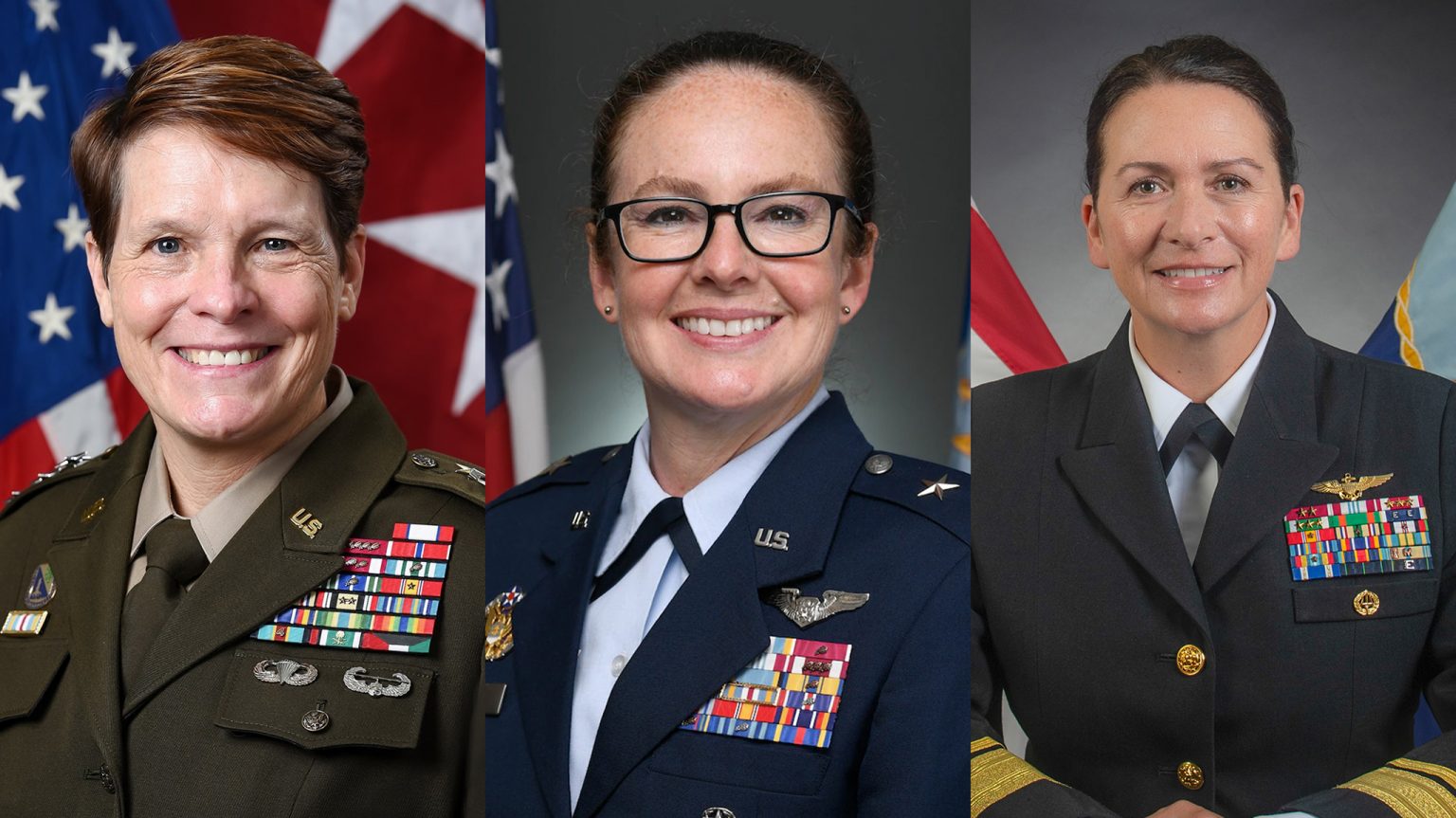Lott Institute, Army ROTC collaborate to bring civilian and military leaders for campus chat

Lt. Gen. Maria R. Gervais (left), Brig. Gen. Stacy Jo Huser and Rear Adm. Nancy Lacore are set to speak Feb. 9 at the Gertrude C. Ford Center for the Performing Arts about their experience with diversity and inclusion as female leaders in the U.S. Army, Navy and Air Force. The session is part of a collaborative speaker series organized by the university’s Army ROTC and Trent Lott Leadership Institute. Submitted photos
JANUARY 31, 2023 BY CLARA TURNAGE
Three female leaders of the Army, Navy and Air Force will visit the University of Mississippi next month to lead a discussion on diversity and inclusion in the armed services.
Lt. Gen. Maria R. Gervais, Brig. Gen. Stacy Jo Huser and Rear Adm. Nancy Lacore will speak on campus beginning at 2:30 p.m. Feb. 9 in the Gertrude C. Ford Center for the Performing Arts. The military leaders will talk about their experiences and challenges with being female leaders.
In the second event of an ongoing collaborative speaker series, the university’s Army ROTC and the Trent Lott Leadership Institute will welcome three women in power for a panel discussion regarding “Diversity and Inclusion in Today’s Dynamic Leadership Environment.”
Maj. Joy Harry, executive officer and Army ROTC instructor, said she wants young women and men to learn from the examples of the speakers.
“We don’t want young females and young female officers to feel they are always walking in the shadow of men,” she said. “These women are pioneers in their fields and in their branches.
“At the same time, it is just as important for young men to see these women as leaders. Diversity and inclusion aren’t a passing phase in the military. It’s here to stay.”
Gervais is deputy commanding general and chief of staff for the United States Army Training and Doctrine Command, which oversees training of Army forces and develops operational doctrine. The 36-year veteran has held a variety of command and staff positions.
Huser, who joined the U.S. Air Force in 1996, is principal assistant deputy administrator for military application in national nuclear security administration for the Department of Energy. In that role, she assists the deputy administrator for defense programs in maintaining the reliability, safety and security of the nation’s nuclear stockpile.
She has experience in space and missile operations and served as a space operations crew member and instructor.
Lacore is commander of the Naval District Washington, a region that encompasses more than 4,000 square miles and is the provider of support to naval installations within a 100-mile radius of the Pentagon. Designated as a naval aviator in 1993, Lacore has flown multiple tours in helicopter combat support squadrons and served as the chief of key leader engagement in Kabul, Afghanistan.
“Even in the more diverse fields of the military, these women stand out as leaders,” said Melissa Jones, associate director of the Lott Leadership Institute. “It’s been a mixture of magic for them to be able to be here at the same time, and it will be interesting to see three branches of the military represented by these high-ranking women.
“They’re all leaders, but their paths to leadership are very different.”
Jones said the panel discussions will ask questions such as:
- What could your branch of the military gain by more diversity?
- What are the barriers you have faced in your journey to leadership?
- How has the evolution of diversity and inclusion changed your branch?
“We’re really digging into their personal experiences,” Jones said. “There are so many lessons with military life and leadership that apply to civilian life. These women know how to lead; they wouldn’t have gotten where they are if they didn’t.”
It is important for young women and men to hear about the experiences that led these women to the leadership positions they hold, said Lt. Col. Vincent Jackson, chair of the Ole Miss Department of Military Science.
“These women have been in the military during the time of the first female fighter pilots, many female firsts,” Jackson said. “These women command respect wherever they go. No matter what room they walk into, you see the stars on their shoulders and you can’t just sweep them under the rug. You have to listen.
“It’s important to see females in leadership roles because that is our future. They are the face of our military.”
While celebrating the progress these women have made, it’s similarly important to acknowledge how far each respective branch must go to reach full equity, Harry said.
“It’s important to see how far we’ve come,” she said. “But we still have a long way to go.”